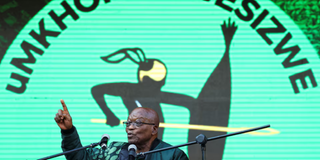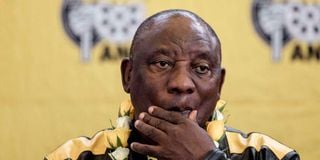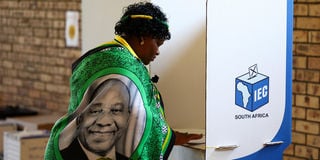A month can be a long time in politics. But politicians in South Africa, as in most parts of the continent, are feeling the heat of not knowing what exactly is coming, or what voters might do next.
Picture this: Last month, the ruling African National Congress (ANC) suffered its worst election result in 30 years, winning just 40 per cent of the vote and forcing it to scramble for coalition partners.
The beneficiary of this election appeared to be former president Jacob Zuma’s uMkhonto we Sizwe (MK), which came in third after most ANC supporters in KwaZulu-Natal province switched to MK. But this victory didn’t last.


About three weeks later, the uMkhonto we Sizwe party (which means Spear of the Nation in Zulu) was all but crushed in the local government by-elections.
After a dozen local government by-elections in KwaZulu-Natal province last week, MK was kept out of power in the region by a coalition that includes former provincial leaders. MK had won 45 per cent of the national vote but only one seat in the by-election.

Former South African President Jacob Zuma speaks to his suppoters during the launch of the election manifesto of his new political party, uMkhonto we Sizwe, ahead of a general election on May 29, at a rally in Soweto, South Africa, May 18, 2024.
Photo credit: Reuters
By-elections were held to fill vacant local government seats in both KwaZulu-Natal and the Western Cape. The ANC retained three seats, while the traditionalist Zulu Inkatha Freedom Party (IFP) won five seats and retained two.
The Democratic Alliance (DA), part of the shaky ANC-led Government of National Unity (GNU) and the ruling coalition in KwaZulu-Natal, won four seats and retained three.
MK, which failed to live up to expectations of being the ‘new Zulu powerhouse’, contested most of the 18 seats involved in the by-elections, including all in KwaZulu-Natal, but won only one seat.
Turnout was higher than expected in all the by-elections, suggesting that local politics is more important than the national outcome on May 29.
One factor in the elections was how looming local economic problems fuelled interest in politics: The ANC lost on May 29 largely because young South Africans felt disillusioned by the widening gap between rich and poor and rising unemployment.
KanaKana Mudzanani, the founding chairperson of the SA Youth Economic Council, a youth representative body, says these young voters demanded a change in leadership to alleviate their situation.
“If there’s no political intervention (from President Ramaphosa down), there’s not much that can be done,” he said in a programme on local news channel Mudzanani.

South African President Cyril Ramaphosa looks on as he addresses new members of the African National Congress (ANC) during an election campaign ahead of the 2024 general elections, at the Nelson Mandela Community Youth Centre in Chatsworth township, north of Durban, on May 14, 2023.
Photo credit: Rajesh Jantilal | AFP
The ANC’s nascent GNU has struggled with member parties haggling over positions.
“We want politicians not to fight over who gets what post, but to work together for the betterment of the country. We want them to solve the problems of Eskom, provide useful education and get the economy moving again to create jobs.
This, he says, is the “real change that will positively affect the youth and all South Africans”.
The GNU is led by the ANC, together with the former official opposition DA, Inkatha and several other smaller parties.
President Cyril Ramaphosa, speaking ahead of the expected announcement of his new Cabinet, said it was important for the GNU to work so that South Africa could recover and grow under new collective leadership.
The country’s economy has been in the doldrums for at least 10 years, in large part due to incompetent and corrupt governance, which every party, including the ANC itself, has said must be rooted out by the GNU.
The poor economy has meant a shrinking state budget, growing national debt and massive unemployment.
The ANC’s failure to secure an outright majority has generally been seen as a severe reprimand by the voters, with both Ramaphosa and ANC party secretary general Fikile Mbalula saying that if the ANC and the GNU fail, the ‘party of Nelson Mandela’ stands a good chance of being ‘swept into oblivion’, as Mbalula put it.

A woman wearing the African National Congress (ANC) regalia votes during South African elections in Hopetown, Northern Cape province, South Africa on May 29, 2024.
Photo credit: Siphiwe Sibeko | Reuters
But the GNU’s troubles haven’t benefited the MK.
Its strong showing in KwaZulu-Natal, SA’s most politically volatile region and home to some 20 million people, appeared to be a flash in the pan and made it look like the by-elections would be easier.
“I thought it was odd that MK was suddenly not performing at the level it had in the (national) elections,” says Prof Daryl Glaser of the University of the Witwatersrand’s Department of Political Studies. But there is an explanation.
Much of the vote in KwaZulu-Natal for MK in the May 29 election, he says, seemed to be a personal vindication of Jacob Zuma, whom many Zulus felt had been badly treated by the ANC before he resigned.
“It was more a symbolic gesture around Zuma than a choice of policy. But when it comes down to the local ward level, it may be more important to vote for someone you believe will actually deliver services (such as water, refuse collection, sanitation and electricity),” says Prof Gaser.
Shortly after the national elections, MK, which came third in the polls, was left out of the coalition. Some believe that personal differences between President Ramaphosa and his deputy Zuma played a role. The ANC also left out the Economic Freedom Fighters (EFF), which is seen locally as a breakaway faction of the ANC. This omission may have played a role in MK’s losses in the by-elections as people felt left out of the national cake. But given the recent swing in voting behaviour, it may be difficult to write off the MK just yet.
“I don’t think it’s clear yet whether MK, which still lacks formal structures, will last – but I hesitate to count Zuma out, as so many have in the past, and I wouldn’t underestimate his personal popularity among Zulus, nor the potential for serious trouble in KwaZulu-Natal,” Glaser said.
The poor showing after such a resounding success has raised questions about MK’s long-term viability as a political formation.
Zwelethu Jolobe, an associate professor at the University of Cape Town, said MK faced several problems that other parties, including previous breakaways from the ANC, did not have to deal with.
“Firstly, MK is totally focused on Jacob Zuma – at least at the moment. That is why it did not immediately enter parliament (where it won 58 seats out of 400).
“Then there is the fact that it has no formal structure yet, has changed leaders and has not even had a party conference, so there are no office bearers.
“And it has no organisational base on the ground – the national election results are far more a protest vote than a move to a party with a full policy platform,” said Dr Jolobe, from UCT’s Department of Political Studies.
“MK does not have a strong organisation, unlike all the other parties, including previous breakaway groups such as COPE and the Economic Freedom Fighters (EFF), which were also formed by disgruntled ANC supporters, but held formal conferences, elected officials and set up campaign organisations,” he added.
Zuma himself is barred from leading the MK party in parliament (at least until the end of 2027) because of a previous conviction.
Source link : https://nation.africa/kenya/news/africa/parties-sweat-as-south-african-voters-become-unpredictable-4672366
Author :
Publish date : 2024-06-28 06:43:53
Copyright for syndicated content belongs to the linked Source.





